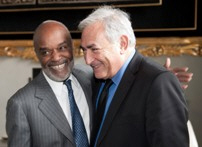
Typical street scene in Santa Ana, El Salvador. (Photo: iStock)
IMF Survey: IMF Chief Emphasizes Support for Haiti
April 1, 2010
- Strong Haitian ownership will be key to reconstruction success
- Immediate budget support for Haiti is essential
- Proposal on debt relief to be presented soon
Rebuilding the Haitian economy will require immediate financing for Haiti’s budget, said Dominique Strauss-Kahn, the global lender’s managing director, during a donors’ conference at the United Nations.

IMF Chief Strauss-Kahn (r) with Haitian President Rene Preval at the UN for a donors’ conference on Haiti (photo: IMF).
ASSISTANCE AFTER NATURAL DISASTERS
“Budget support this year is absolutely essential,” Strauss-Kahn said during the meeting in New York on March 31, which included Haitian President René Préval, United States Secretary of State Hillary Clinton and U.N. Special Envoy for Haiti Bill Clinton.
Strauss-Kahn encouraged donors to provide Haiti with the $350 million in budget support needed in 2010, according to IMF forecasts. The country faces higher spending needs and a halving of its revenues, and the alternative of high central bank financing could lead to spiraling inflation, which would erode the purchasing power of the poor.
IMF led the way with funds and help
In the days after the devastating earthquake hit the Caribbean nation on January 12, the IMF responded rapidly to Haiti’s needs, and quickly approved $114 million in assistance, the first international organization to provide help in the aftermath of the quake.
The money was used to get cash circulating in the economy so that people could buy food and employees could be paid. The funds are also helping Haiti pay for urgently needed imports.
The IMF’s economic forecast for Haiti is encouraging, according to Strauss-Kahn, with average growth expected to be 8 percent for the next five years. This will help boost the country’s GDP to $1000, compared to $600 prior to the earthquake.
The UN estimates the cost of the total damage and losses in Haiti is roughly $7 billion. A total of $11.5 billion is being sought over the next 10 years for Haitian reconstruction.
Strauss-Kahn said the involvement of the private sector will be important to get the economy working again, and the IMF is working closely with the Haitian government to build a partial credit guarantee fund, which will help the private sector get back to work.
IMF accompanies Haiti on road to recovery
Countries and organizations attending the conference have pledged more than $8 billion so far to help Haiti’s people and economy in the aftermath of the massive earthquake that struck the country two months ago, according to the UN.
Strauss-Kahn also told the UN conference the IMF will present a proposal for the approval of the Executive Board to organize debt relief for Haiti’s total outstanding debt.
Since January, the IMF has continued to work on a number of fronts to help Haiti rebuild its economy.
Earlier in March, an IMF team worked with the Haitian government to revise post-earthquake economic projections, based on the detailed estimates of damages and losses contained in the Post-Disaster Needs Assessment coordinated by the UN.
The IMF was also part of the international donors meeting held in Montreal in late January, which started to lay the foundations for Haiti’s recovery. The partners in Haiti’s reconstruction set out some key principles for their work, including Haitian ownership of the process and coordination with international donors.
On March 25 the IMF joined a group of Haitian and international civil society organizations at the United Nations for a meeting to discuss the best ways of delivering Haiti the help it needs. While humanitarian work is ongoing, the group also focused on the long-term vision for Haiti’s reconstruction and economic growth.
Strauss-Kahn said ownership by Haitians in rebuilding their economy is the key to success.
“For all of this to work, the Haitian authorities need to be in the drivers’ seat,” he said. “The IMF experience is that, for such a program to work there needs to be real ownership by the country.”


